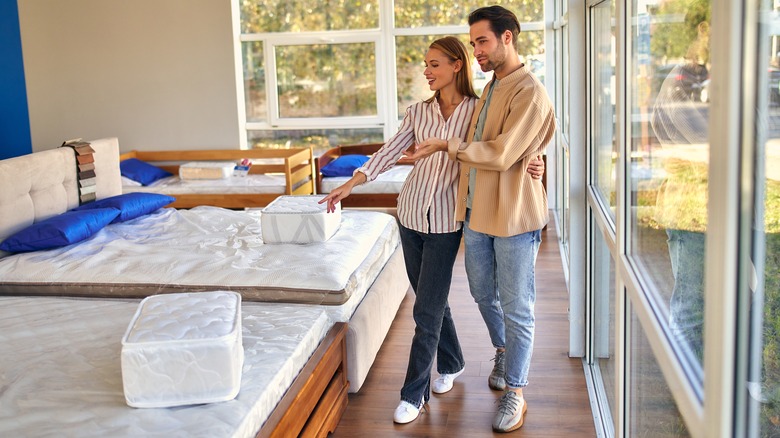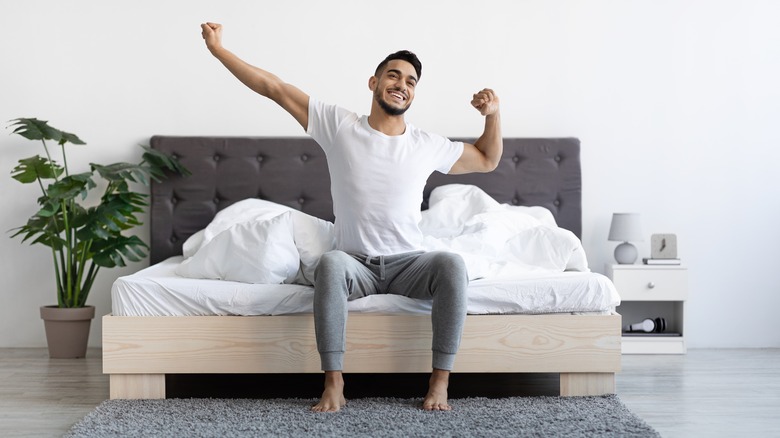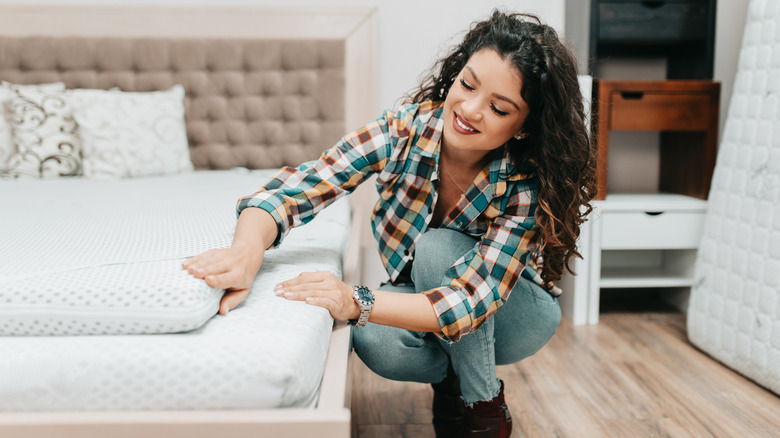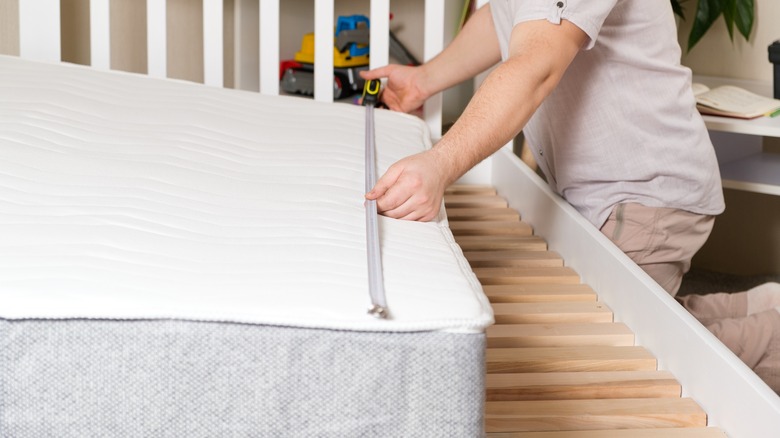What Size Bed Should You Buy Based On The Size Of Your Bedroom?
Getting a good night's sleep is one of the best things you can do to take care of yourself, and experts agree that quality sleep — and enough of it — is an essential part of leading a healthy lifestyle.
According to Sleep Foundation, a healthy amount of sleep allows the parts of your brain that affect memory and concentration to function properly while also helping to prevent disease — with a Harvard study (published in the journal Sleep Health) adding that those who do not regularly get at least a full six hours of sleep every night are 2.5 times more likely to struggle with frequent mental health problems.
As it turns out, one of the biggest factors affecting your quality of sleep is the mattress you sleep on, and according to The Beloit Mattress Company, the wrong size mattress can prevent you from getting a restful sleep every night. Ensuring that you have the properly sized mattress that works best for your space and for your lifestyle is crucial in getting your sleep back on track if you're prone to tossing and turning.
Bigger isn't always better
It's easy to assume the larger a mattress is, the better it is for your sleep; however, selecting the right size mattress is a bit more complicated than that.
Because many people have limited living space in their bedrooms to work with (or they live in a tiny studio apartment without a bedroom at all), investing in the largest possible mattress isn't always the most realistic option. Mattresses that are too large can steal a lot of valuable open living space and can be difficult to fit through doors and hallways — not to mention if you live in an apartment building and your unit isn't on the first floor, it will be pretty difficult to talk your friends into helping you move it.
That's why ZOMA says choosing the right sized mattress should be more of finding the happy medium between a mattress that is too small and leaves you feeling cramped and sore, and a mattress that is unnecessarily and overwhelmingly large.
Common mattress sizes
The size of your bedroom, your height, and whether or not you're sleeping alone all determine the proper mattress size for your situation. According to MyMove, a standard-sized twin bed is ideal for children, as well as single adults that don't necessarily need a lot of extra sleeping space; though if you are a bit taller, a twin XL mattress might be more comfortable than a standard twin due to the extra length.
A step up in terms of size is a full mattress, which is an ideal option for a single-sleeping adult who tends to move or spread out throughout the night, whereas a queen mattress is slightly larger still and ideal for couples — though for couples where one or both partners tends to move a lot during their sleep, a king mattress may be a better fit, particularly if pets or children tend to join the sleeping arrangement and crowd the bed.
Although slightly less common, California king mattresses are also a popular option for couples where one or both partners is particularly tall. Though the width is narrower than a standard king, many people find that the added length more than makes up for it.
Best mattresses for children and single adults
According to Mattress Firm, twin mattresses measure 39 inches wide by 75 inches long, making it the smallest mattress size available outside of a crib mattress. That is why twin beds are usually the first real bed that most children get as they transition out of cribs – though some parents opt to put their child in a full-size or even a queen-size bed right away so they can grow into it while also allowing extra room for co-sleeping if need be.
Like a twin-size mattress, a full-size mattress is 75 inches long; however, at 54 inches wide, a full mattress offers 15 more inches of space than a twin does. Though a full-size bed is a suitable option for a single adult with not much space to work with, Mattress Firm estimates that if a couple were to attempt to share a full-size bed, each partner would be left with only 27 total inches of personal space — which is about the same amount of space that a baby has in a crib.
Best mattresses for couples
A queen-size mattress measures 60 inches wide by 80 inches long, per CNET, and is therefore a far more ideal size for a couple to share. However, according to a study by YouGov America, 21% of married couples say their partner takes up more than half the bed — so if you or your partner is prone to bed hogging, investing in a king-size mattress might be a better option.
While a king mattress is the same length as a queen, it provides you with 76 inches of width as opposed to 60, giving you and your partner both some much needed personal space if you aren't big on snuggling throughout the night. Another study from YouGov America found that 66% of pet owners share their bed with their furry friends, making those pet owners good candidates for king-size mattresses, too.
Finally, a California king mattress is 4 inches narrower in width but also 4 inches longer than a king mattress, providing 7 feet of length for taller individuals for whom more traditional mattresses simply are not long enough to accommodate.
Measure, measure, measure
While simply "eyeballing" your space is certainly convenient, the only way to fully ensure that your mattress will fit comfortably into your living space is by measuring.
According to The New York Times, you should start by writing down the dimensions of the bed frame that your mattress will eventually sit on top of, making sure to account for the headboard if you have one. You can then create an outline on the floor where you plan to put your bed by marking it with painter's tape — ensuring that the bed will have at least 3 feet of space on all sides of the bed to freely walk around and make the bed, while also ensuring that the bed won't be in the way of your nightstands, as well as any closet doors or dresser drawers when opened.
If you have a particularly small bedroom or live in a studio apartment and the ideal bed for you simply will not comfortably fit in your living space, the Times suggests investing in a platform bed with built-in storage, allowing you to potentially eliminate a dresser or two and free up some of your occupied space for your bed.
If you're short on space for the mattress size you want, MyMove suggests swapping out traditional closet doors with sliding ones that don't demand as much room when opened. You can also utilize wall-mounted storage and floating shelves to free up some room on the ground.





